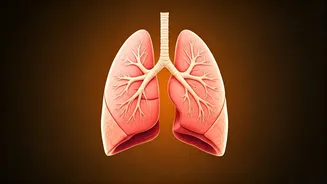Detoxifying with Diet
The aftermath of Diwali, marked by a surge in air pollution, calls for proactive measures to safeguard your respiratory well-being. Your diet plays a pivotal
role in this, and incorporating certain foods can aid your lungs in detoxifying themselves. This isn't merely about eating; it's about making conscious choices to support your body's natural processes of eliminating pollutants. These food choices work by either directly combating inflammation caused by pollutants or by supporting the body's natural detoxification pathways. By focusing on incorporating these items, you can effectively help your body recover and protect itself against the harmful effects of post-Diwali air pollution. Consider these dietary changes not as a temporary fix, but as a commitment to maintaining healthy lungs throughout the year.
Garlic's Powerful Defense
Garlic, with its potent compounds like allicin, emerges as a vital ally in lung detoxification. Allicin, known for its strong antioxidant and anti-inflammatory properties, acts as a defense against the pollutants that settle in your lungs after Diwali. Its consumption can help in reducing inflammation, thereby alleviating some of the respiratory distress caused by polluted air. Regularly including garlic in your diet—whether raw or cooked—aids your body in eliminating toxins. Consider adding garlic to your meals, such as curries or stir-fries, to get the most benefits. This simple addition can significantly contribute to better respiratory health, helping you breathe more easily and effectively, and is a simple yet impactful strategy to counter the negative impacts of post-Diwali air quality.
Ginger's Anti-Inflammatory Action
Ginger's role extends beyond its flavorful presence in Indian cuisine; it is a champion of lung health. The compounds within ginger are remarkable for their ability to combat inflammation, which is often aggravated by pollution. Inflammation can lead to breathing difficulties, coughs, and other respiratory issues, which are especially prevalent during the post-Diwali period due to heightened air pollution. Ginger can help reduce these symptoms, providing relief. Its anti-inflammatory properties work at a cellular level, helping your lungs to heal and recover from exposure to pollutants. Ginger can be incorporated into your daily routine by adding it to tea, smoothies, or using it as a spice in your cooking. This simple step can greatly aid in easing respiratory issues and help to support lung health, enabling you to breathe more freely and easily in the days following Diwali.
Turmeric's Curcumin Power
Turmeric, a staple in many Indian dishes, contains curcumin, a compound with potent antioxidant and anti-inflammatory abilities. After Diwali, when the air quality is particularly poor, the antioxidant and anti-inflammatory benefits of turmeric become extremely important. Curcumin actively battles the free radicals and inflammation caused by pollutants, shielding your lungs from damage. Incorporating turmeric into your daily diet can protect your lungs and reduce the risks of various respiratory ailments. Adding a pinch of turmeric to your food, drinking turmeric milk, or using it in curries can provide these benefits, supporting your body's defenses against the pollution that plagues the post-Diwali atmosphere. Regular use of turmeric can significantly aid your lungs' ability to cleanse and recover from the effects of harmful pollutants.
Citrus Fruits for Immunity
Citrus fruits like oranges, lemons, and grapefruits are rich sources of Vitamin C, a powerful antioxidant that helps boost the immune system. After the high pollution levels of Diwali, it is particularly important to support your immune system. Vitamin C helps in neutralizing harmful free radicals that are common in polluted air, thus protecting your lungs from oxidative stress. Regular intake of citrus fruits ensures your body is well-equipped to defend itself against pollutants, supporting respiratory health. Consuming citrus fruits daily, whether in the form of fresh juice or whole fruits, can significantly strengthen your defenses against respiratory problems. Making these fruits part of your regular diet during the post-Diwali period is a practical step towards safeguarding lung health.
Leafy Greens' Detox Benefits
Leafy greens, including spinach, kale, and other similar vegetables, are excellent sources of antioxidants, vitamins, and minerals that support overall health, including lung health. The high concentration of nutrients in these greens is especially beneficial in the polluted environment following Diwali. They help in removing toxins from your lungs, strengthening your body's natural defenses. Consuming leafy greens ensures that your lungs have the necessary nutrients to cleanse and repair themselves, reducing the impact of air pollutants. Make an effort to add leafy greens to your meals, whether as salads, cooked vegetables, or blended into smoothies. They can help your lungs to detoxify and maintain their health, improving your respiratory well-being and overall quality of life.
Apples for Respiratory Health
Apples are rich in antioxidants, including quercetin, which is particularly beneficial for respiratory health. Quercetin aids in reducing inflammation and protecting the lungs from damage caused by air pollutants. Regular consumption of apples has been associated with improved lung function, making them a suitable addition to your diet during the post-Diwali period. Apples contribute to maintaining clean and healthy lungs, minimizing the negative impact of pollutants. Eating an apple daily, whether as a snack or included in meals, is a practical step towards improving your respiratory health. Their ease of availability and rich nutrient profile make them an easy choice to help support your body in eliminating toxins and supporting healthy breathing.
Berries for Antioxidants
Berries such as blueberries, strawberries, and raspberries are full of antioxidants, which play a critical role in safeguarding your lungs against damage from air pollutants. Antioxidants help fight free radicals that are produced due to pollution, protecting the cells in your lungs. Including berries in your diet is an easy and delicious way to increase your antioxidant intake. The regular consumption of berries helps to improve overall lung function and minimize inflammation, which supports respiratory health during the post-Diwali period. Adding berries to your breakfast, snacks, or incorporating them into desserts not only makes your food more delicious but also gives your lungs a boost in fighting off pollutants and enhancing overall wellness.
Water's Crucial Role
Staying well-hydrated is vital for maintaining healthy lungs, especially after exposure to pollutants. Water helps to keep your airways moist, facilitating the easy removal of mucus and pollutants from your lungs. This natural cleansing process can minimize irritation and inflammation caused by post-Diwali pollution. Drinking enough water aids in the efficient functioning of your lungs, enabling you to breathe freely and comfortably. Aim to drink an adequate amount of water throughout the day, and consider incorporating hydrating foods, like fruits and vegetables, into your diet. By staying hydrated, you support your body’s natural detoxification processes, supporting lung health and reducing discomfort related to pollution.
Nuts and Seeds for Protection
Nuts and seeds, such as almonds, walnuts, flaxseeds, and chia seeds, are good sources of antioxidants and healthy fats, which assist in protecting your lungs. These foods contain nutrients that help fight inflammation and protect lung tissue from damage caused by pollutants. Regularly incorporating nuts and seeds into your diet can help reduce the adverse effects of post-Diwali pollution. Their rich content of vitamins, minerals, and healthy fats help boost lung health and help in the elimination of toxins. Adding a handful of nuts and seeds to your daily meals or snacks helps to ensure the intake of vital nutrients that support optimal respiratory function. This is a simple but effective strategy to support your lungs during times of increased pollution, helping you to breathe more comfortably and safely.















